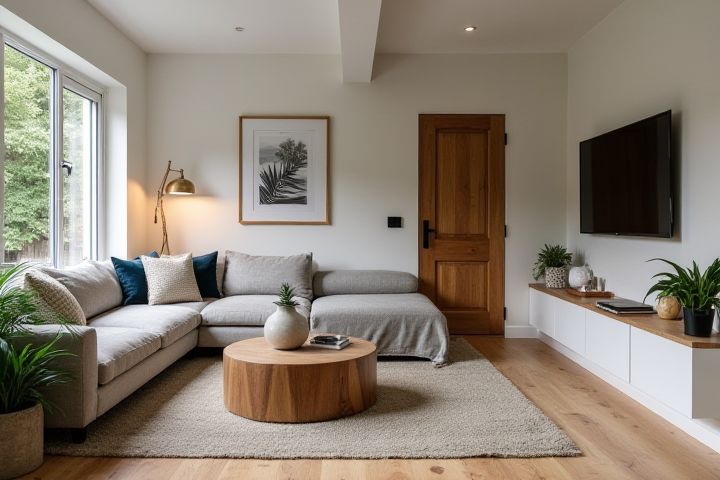
Living in a house during renovations is feasible, but it requires careful planning and consideration. You should assess the extent of the renovations; minor updates like painting or flooring can often be managed while you reside in the space. However, significant remodeling that impacts essential utilities, such as plumbing or electrical systems, may necessitate temporary relocation for safety and comfort. Creating designated living areas can help you maintain a functional home environment amidst the chaos of construction. Be prepared for noise, dust, and schedule delays, as these factors can affect your daily routine.
Can I Live In A House While Renovating
Safety requirements
Living in a house during renovations can present safety challenges that require careful consideration. Ensure that all construction areas are properly cordoned off with barriers to prevent accidental access, especially for children and pets. Install smoke detectors and keep fire extinguishers accessible, as exposed wiring and flammable materials increase fire risk; check that you have at least one functioning smoke detector per floor. Maintain good ventilation to minimize exposure to dust and fumes from paints or adhesives, aiming for at least three air changes per hour in renovation zones.
Noise and dust
Renovating a house while you continue to live in it can expose you to significant noise and dust, impacting your comfort and health. Noise levels can reach up to 90 decibels during construction activities, which may disrupt your daily routine and lead to sleep disturbances. Dust generated from renovations can remain airborne, with particulate matter often exceeding safe levels; it's crucial to use air purifiers and maintain good ventilation. To minimize disruptions, consider scheduling heavy work during the day while you are away and sealing off renovation areas to keep dust contained.
Temporary utilities
Living in a house during renovations is feasible with proper planning for temporary utilities. Ensure access to essential services, such as a reliable water supply and electricity, which can often be arranged through temporary connections. Consider using portable toilets and setting up a makeshift kitchen area, incorporating appliances like microwaves and mini-fridges. Depending on the extent of your renovations, maintaining heating or cooling may be essential, so portable heating units or air conditioning units can be beneficial.
Limited access to certain areas
Living in a house while renovating can be feasible, but it often involves limited access to specific areas. For instance, if you're remodeling the kitchen, you might need a makeshift cooking area set up in another room, which could limit your access to the appliances and storage you typically use. Restrooms may also be impacted; for major renovations, having only one working bathroom can create significant inconveniences. Planning your renovation timeline around these limitations can help maintain a semblance of normalcy during the transition period.
Potential delays
Renovating a house while living in it can lead to significant potential delays due to various factors. Unforeseen structural issues, such as mold or damage, can emerge during demolition, extending timelines by weeks or even months. Furthermore, the constant presence of your daily routine may hinder specialists' ability to work efficiently, causing further setbacks. Planning for these potential disruptions is essential; having a flexible timeline and budget can help you navigate the challenges of living in a home under renovation.
Alternative accommodation options
Consider renting a nearby apartment or a small vacation home for the duration of your renovation. Short-term rental platforms like Airbnb and Vrbo offer flexible booking options, making it easier to find a suitable place for your needs. You might also explore local serviced apartments, which provide the comfort of home with the convenience of utilities included. Alternatively, if you have friends or family nearby, staying with them can significantly reduce your expenses during the renovation process.
Building permits
Living in a house during renovations can be feasible, but it's essential to check local building permits and regulations. Many jurisdictions require specific permits for construction, especially if plumbing, electrical, or structural changes are involved. Non-compliance can result in fines, work stoppage, or mandated removal of changes made without approval. Ensure that you review your local authority's guidelines and obtain the necessary documentation to minimize disruptions and legal issues during your renovation.
Budget management
Living in a house during renovations can significantly affect your budget management. It's crucial to create a detailed budget that accounts for both the essential renovation costs and the potential for unexpected expenses, which can average 10-20% more than your initial estimates. Prioritize projects that improve livability, such as updating the kitchen or bathrooms, which typically provide the highest return on investment, often recouping over 70% of costs. By making strategic decisions and staying organized, you can maintain your living space while effectively managing the financial aspects of your renovations.
Communication with contractors
Living in a house during renovations can be challenging, but effective communication with your contractors is crucial for a smooth process. Clearly outline your expectations, timelines, and budget considerations to prevent misunderstandings; a detailed schedule can help both you and your contractors stay on track. Designate specific areas of the home as work zones and separate living areas to minimize disruption and ensure safety. Regular check-ins, ideally weekly, can keep you informed of progress and allow for any adjustments needed in real-time, fostering a collaborative atmosphere.
Insurance coverage
When living in a house during renovations, it's crucial to evaluate your insurance coverage to ensure adequate protection. A standard homeowners insurance policy typically covers damage to your home, but it may not account for renovations, which can present additional risks. You can consider extending your coverage or obtaining a builder's risk insurance policy that specifically addresses the renovations being undertaken. Always communicate with your insurance provider about your plans, as they can guide you on necessary policy adjustments or endorsements that will keep you protected during this process.
